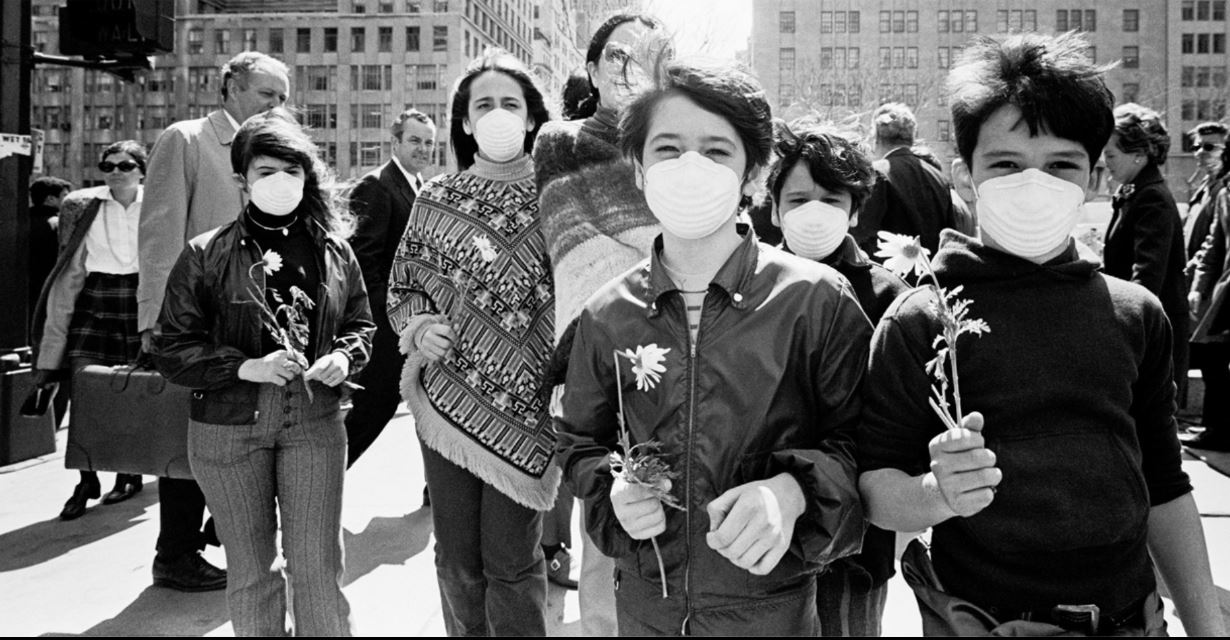
Swiss launch ‘democratic’ hygiene mask production

The production of protective face masks should be decentralised and made more democratic, according to two Swiss campaigners. They hope their initiative can prevent cases of fraudulent and ruthless practices by the business community.
Marie-Claire Graf, one of the sponsors of the Swiss-led project, says it is highly unethical to try and make a lot of money with health products used to fight the spread of Covid-19.
“The issue of exorbitant prices and falsified certificates has taken on a political dimension,” says Graf. The 24-year-old Swiss is an expert on sustainability and a member of the youth constituency of the United Nations Framework Convention on Climate Change.
Together with other activists, she has been talking to producers, experts on certification and other interest groups, in an effort to organise a special business venture.
The project is being launched as face masks become a commodity in many countries, which are trying to soften the impact of a possible wave of coronavirus infections.
The Swiss government made hygiene masks mandatory for passengers using public transport at the beginning of July, while some young entrepreneurs reportedly made millions by importing protective gear from China and selling them to the Swiss armed forces during the first wave of the pandemic three months ago.
Production machines
The Protective Mask Initiative aims to provide machines for the production of hygiene equipment to governments and institutions as well as private companies and individuals who have submitted an application.
As part of the package, they will also receive basic materials, including fleece fabric, filters and elastic bands at no cost.
Participants in the venture will have to undergo a certification procedure for the masks. If the products pass the test, they are free to sell their products at prices they set themselves. In addition, they will have to pay a small fee to the initiative group for the use of the machines.
More
Graf says the idea is to establish a decentralised production system to “enable everybody to manufacture masks on their own”. The first wave of coronavirus infections has shown that a central production system has failed, she adds.
The first franchise holder is Germany’s main mask manufacturer. The Berlin-based firm ordered a dozen machines and is about to launch production.
The masks are destined for major German and international companies, including an airline and a retail chain, she says.
Swiss branch
Graf has teamed up with economist and author Oliver Fiechter to approach business partners in Switzerland, notably local authorities, cantons and the armed forces, as well as hospitals and major private firms.
It is crucial to get the project started as quickly as possible, as a second wave of the Covid-19 infections is imminent, according to Graf.
The initiative has received about 100 requests from Europe and elsewhere, she says. Stakeholders are from the United States, Brazil, Russia, Turkey, Tunisia and Egypt.
The venture has taken off like a rocket, says Graf. A first series of 30 machines is almost fully booked.
The initiative group therefore aims to increase the number of machines leased out to 300 in the weeks and months to come.
Developing countries
The money from the production is re-invested in extending the project.
Graf says the initiative group has shouldered several risks. Not only are they providing the funds for the investment, but they will also have to be liable financially in case of damage to a production machine. Loss of fees – if a franchise holder is unwilling or unable to pay – is another risk.
If the initiative gathers speed, it hopes to let underprivileged regions of the world have a direct benefit.
“We are currently considering plans with UNICEF [the UN international children’s fund] which countries could take part in our project,” says Graf.
Adapted from German by Urs Geiser
This is how it works:
The “Contractors”: Graf and Fiechter subject the prospective customers to a background check and clarify their needs with them. The franchisees are contractually obliged to produce and sell protective masks.
The machines: They come from the company Maschinenbau Leipzig (MBL), which specialises in automation. Some precision parts are made by Swiss companies.
A machine costs around €350,000 (CHF372,175) and can produce up to three million masks per month. Graf and Fiechter have collected around €5 million in their networks for the pre-financing.
The raw materials: The initiators also rely on the highest quality for the fleece as the basic material. The suppliers come from Switzerland, Germany, Portugal and Turkey, but also from China and India.
The business model: The machines delivered remain in the ownership of the initiative. The franchisees are charged a usage fee of between CHF0.20 and CHF0.80 (for standard or filter masks) for each mask manufactured.
The next level: In order to be prepared for a possible next pandemic, Graf and Fiechter plan to digitally connect the production machines that were once distributed across the globe. They hope to reach people in pandemic hotspots more quickly.
The market: The initiative instantly turns Graf and Fiechter into players in a billion-dollar market. “The initiative is a win-win-win situation, because everyone involved is set to benefit,” says Graf.
The benefit: The dimensions of the Swiss invention is based on the following calculation: with an output of 2 million standard masks, €560,000 flow back to the initiative group – per month and machine. With a contract of two years – maximum term is three years – that would be over €13 million. With 30 machines, that would be a total of more than €400 million in two years.
Adapted from German/urs

In compliance with the JTI standards
More: SWI swissinfo.ch certified by the Journalism Trust Initiative



























You can find an overview of ongoing debates with our journalists here . Please join us!
If you want to start a conversation about a topic raised in this article or want to report factual errors, email us at english@swissinfo.ch.